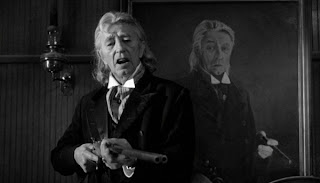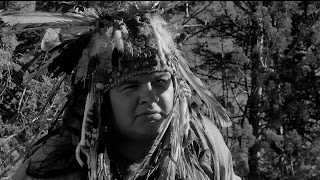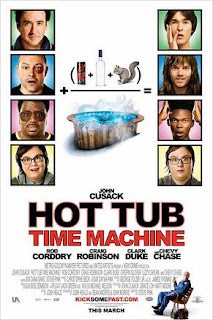Tim Burton is one of my favorite directors, because he makes odd little films that somehow manage to become big hits. I tend to prefer his more intimate work (
Edward Scissorhands,
Ed Wood,
Big Fish) over his obvious blockbusters (
Batman,
Planet of the Apes), but I always find his work interesting. When you add my favorite actor and Burton collaborator, Johnny Depp, to the mix, you definitely have my attention. Add those two oddballs to the fictional world of Lewis Carroll's
Alice in Wonderland, and you have a guaranteed formula for weirdness.
It should be pointed out that, despite the title, this actually isn't an adaptation or re-imagining of the source material, or even of the Disney animated classic. Instead, it serves as a sequel of sorts. This time around, Alice (Mia Wasikowska) is a teenager instead of a child. Like all Wonderland stories, this one begins in the real world. Alice is attending a party when she fields an unexpected (and unwanted) proposal for marriage; she is at the marrying age for Victorian England, and the match is sensible and proper. And, in typical Tim Burton style, "sensible and proper" seem positively horrid, with madness being a preferable alternative. Almost as if she is signaling for a rodeo clown to distract the bull away from her, Alice notices a white rabbit wearing a waistcoat. Since her options are follow the rabbit or definitively choose a life path, the nineteen year-old Alice opts to follow the rabbit. From here, things begin to get a little
deja vu; Alice visits all the same places and meets all the same characters that she did in the original stories --- she eats stuff and grows/shrinks, she chases the White Rabbit (voiced by Michael Sheen), she goes to the Mad Hatter's (Johnny Depp) tea party, and gets confused by the Cheshire Cat (voiced by Stephen Fry) and the Caterpillar (voiced by Alan Rickman). Alice seems to be going through these experiences for the first time, but something seems...different about everything. The only clue we have that this is a new tale is the fact that all the the inhabitants of Underland (
not Wonderland) remember an Alice from years ago. It has even been prophesied that Alice will be the one to kill the Red Queen's (Helena Bonham Carter) fearsome dragon, the Jabberwocky (voiced by Christopher Lee).
Alice is supposed to kill a creature of Wonderland? Well, that's different. And, as this film insists, this really isn't Wonderland, but Underland. What's the difference? While both are filled with imaginative landscapes and characters, Underland is the nightmarish twin to the world of Wonderland; apparently, things were once shiny and happy, when the White Queen (Anne Hathaway) ruled, but things have gotten darker and more serious under the Red Queen's reign. But is
this Alice the Alice of the prophesy? Or is this all something else, something darker?
Not too long ago, I read Lewis Carroll's works for the first time. Frankly, I was underwhelmed. I will admit to an unusual joy of language present in these stories, and some pretty interesting imagery, but I wasn't impressed on the whole. In all honesty, I think that these stories are excellent launching points for adventures, but I am happy to see that most adaptations to the stories aren't slavishly devoted to the source material. Obviously, then, I have no problem with Burton's Underland. I do have a problem with the title, though. I've said it before, and I'll say it again, I think that film titles are important indicators of the film's content; if I pop in a DVD titled
Bambi, it had better be an animated deer story, and not a live-action bestiality flick. Titling this
Alice in Wonderland seems disingenuous to me, because the films goes to great lengths to differentiate itself from previous movie incarnations and the source material.
Alice in Underland would have been more appropriate, I think, and still drawn the connection to Wonderland.
The first thing that struck me about this film was its appearance. Visually, this is a fantastic piece of moviemaking. The environment, even though it is almost a post-apocalyptic version of Wonderland, is still full of color and detail. The character designs were astounding, so different from the classic versions of the characters, and yet they all had something iconic that made them seem somehow familiar. The use of CGI in the film was some of the best I have seen utilized in any motion picture. Obviously, the environment was largely CGI, but most of the characters had something altered in post-production, some in subtle ways; Crispin Glover, who plays the Red Knave, had everything except his head replaced by CGI. Tim Burton has always been a visual filmmaker, but this was really a step above anything else I've seen of his.
This film was chock full of recognizable actors, each of whom did a good job. Many of them stuck to the classic interpretation of their characters, but that's not necessarily a bad thing. Matt Lucas (Tweedledee and Tweedledum), Michael Sheen, Stephen Fry, and Alan Rickman were the principal actors who followed that practice. There were several bit parts where I recognized the actor, but not the character. Timothy Spall played a bloodhound, Michael Gough voiced a dodo bird, Crispin Glover was awkward as ever as the Knave, and Imelda Staunton was one of the talking flowers --- none of these were huge roles, but I found it interesting that such small parts were played by actors I have seen in so many other films.
Now let's talk about the departures from the norm. For starters, Paul Whitehouse's March Hare had a dangerous edge to him that bordered on sociopathic. While Christopher Lee's lines as the Jabberwocky fell in line with Carroll's poem, I'm not so sure about the use of this character as a fearsome enemy. Anne Hathaway was okay as the White Queen, showing a few hints at bizarre character traits, but I don't think she had enough screen time to develop her character much. Helena Bonham Carter had more screen time, but most of it was spent emphasizing how odd her character was and was, I think, supposed to generate more laughs than I gave it. I felt that Mia Wasikowska did a pretty good job as Alice, making her one of the stronger heroines I've seen in a children's movie; I'm not entirely convinced that her "roll with the weirdness" attitude was the right one for a character entering Underland, but it was a choice and she stuck to it. And then there's Johnny Depp. The Mad Hatter isn't a character that is usually given depth, but here he has a back story and plays a critical role in the film. To do that, Burton and Depp had to change the character significantly, and not just cosmetically (although his CGI/makeup was some of the most interesting in the film); this Hatter seems to have almost a split personality, with the harmless goofball character that is well known and a Scottish (I think) warrior character that is brand new. I think Depp captured the mercurial nature of his character well, but his character is one of the aspects of this film that I found disappointing.
I have heard that
Alice in Wonderland is not so much a children's story, so much as it is an acid trip told in nonsense rhymes. Yes, this is a story that is typically aimed at children, and yes, this story does has some surreal nightmare qualities to it. I think that balance lends itself nicely to Tim Burton's guiding hand; much of his work appears dark, but has a childlike quality at its core. On the surface, this is a can't-miss concept. In practice, though, all the visual effects in the world can't disguise the fact that the story in
Alice in Wonderland is lacking. There isn't a strong narrative, which shouldn't be a problem, since this is a story that should be about the wonders of this Underland. But the whole movie builds toward a final battle that fails to do anything imaginative and ends up as a surprisingly dull action sequence. Because this movie has that climax and they foreshadow it from the beginning, the rest of the story feels like an unstructured jumble that rambles on without much purpose. Personally, I would have preferred a story where there was more rambling and a less typical climax.
With that story structure in place, though, Alice must be given motivation for trying to thwart the Red Queen's rule. Since Alice is a stranger, that motivation has to come from the supporting cast, which ends up being the most prominent Underland inhabitant, The Mad Hatter. I love me some Johnny Depp, and he is occasionally very charming in this role, but the militant edge to his character is left largely unexplained and his shifts into that persona are abrupt and unexplained. This could have been circumvented if Alice had a personal stake in Underland, but she does not, and remains fairly dispassionate about the bizarre events surrounding her.
This movie just feels like ninety percent of the creative process focused on how the film would look, and maybe ten percent was spent on the story itself. There are so many pieces of this film that work. I liked all the voice acting and I didn't see a poor performance in the whole film. I don't particularly like Depp or Mia Wasikowska's characters, but I think they both played their parts well. There are all sorts of high concept issues brought up in this film (Colonialism, feminism, etc.), but I was happy to see these topics left without any explicit conclusions. And let's not forget just how gorgeous this movie is. Just looking at promotional posters for this movie makes me want to watch it again. No, that's not right...they make me want my own production stills, framed and mounted on my wall. I really liked a lot about this movie. I just didn't like...well, the movie part of it. With such a surprisingly limp emotional core, I was left unsatisfied with the film and extremely disappointed in Johnny Depp and Tim Burton. The gorgeous peculiarity that is
Alice in Wonderland is certainly worth viewing, but the story is inconsequential at best.










